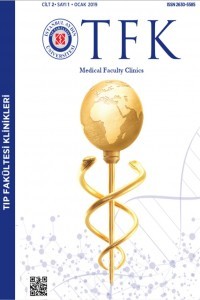Nutrigenomik: Genotipten Fenotipe Beslenme Etkisi
Nutrigenomik, belirli besin bileşenlerinin ve/veya biyoaktif maddelerin, vücuda alındıktansonra oluşturdukları biyolojik yanıtları anlamak ve çözümlemek için moleküler tekniklerkullanan yeni bir disiplindir. Organizmadaki metabolik süreçlerde, besin yanıtının doğruanlaşılması, öncelikle hücresel düzeyde mümkündür. Gen/gen ifadesi-protein-metabolitve çevre ilişkisini kurarak, besinlerin etkisini bir bütün olarak inceleyebilmek için ‘omik’teknolojilerinden faydalanılmaktadır. Genomik, transkriptomik, proteomik ve metabolomikteknolojileri ile mikrobiyota analizleri, kişiye özgü beslenme uygulanabilmesi için önemlisonuçlar ortaya koymaktadır. ‘Omik’ teknolojileri ve mikrobiyota çalışmalarından eldeedilen tüm bilimsel verileri bir araya getiren nutrigenomik disiplini, bir kişinin sağlık durumutemelinde belirli biyolojik gereksinimlere yönelik, kişiye özgü beslenme önerileri sunmaktadır.Gen-diyet etkileşimi çözümlendikçe, çok sayıda kompleks ve kronik hastalığı önleyebilmekveya hastalıkların etkilerini azaltabilmek için uygun beslenme reçeteleri oluşturulacaktır. Buderlemede, nutrigenomik teknolojiler çerçevesinde, besin maddelerinin organizma üzerindekietkileri hakkında bilgi verilmesi amaçlanmıştır.
Anahtar Kelimeler:
Nutrigenomik, Omik Teknolojiler, Mikrobiyota
The Impact of Nutrigenomics From Genotype to Phenotype
Nutrigenomics is a new discipline that uses molecular techniques to understand and analyze thebiological responses that certain nutrients and / or bioactive substances form after they enterthe body. A correct understanding of the nutritional response in the metabolic processes in theorganism is primarily possible at cellular level. ‘Omic’ technologies are utilized to examine theeffect of nutrients as a whole by establishing gene / gene expression-protein-metabolite andenvironment relationship. Genomic, transcriptomic, proteomic and metabolomic technologiesand microbiota analysis provide important results in order to apply personalized nutrition.Nutrigenomic brings together all the scientific data from omic technologies and microbiotastudies to offer a person-specific nutritional advice to specific biological needs based ona person’s health status. As the gene-diet interaction is resolved, appropriate nutritionalprescriptions will be developed to prevent numerous complex and chronic diseases or reducethe effects of diseases. This review aims to give information about the effects of nutrients on theorganism within the framework of nutrigenomic technologies.
Keywords:
Nutrigenomics, Omic Technologies, Microbiota,
___
- 1. Kauwell GPA. Emerging Concepts in Nutrigenomics: A preview of what is to come. Nutr Clin Pract 2005;20:75-87.
- 2. Simopoulos AP. Genetic variation and dietary response: nutrigenetics/nutrigenomics. Asia Pacific J Clin Nutr 2002;11:117-128.
- 3. Martin KR. Using nutrigenomics to evaluate apoptosis as a pre-emptive target in cancer prevention. Curr Cancer Drug Targets 2007;7:438– 46.
- 4. Davis CD, Milner JA. Nutrigenomics, vitamin D and cancer prevention. J Nutrigenet Nutrigenomics 2011;88:582–6.
- 5. Simopoulos AP. Genetic variants in the metabolism of omega-6 and omega-3 fatty acids: their role in the determination ofnutritional requirements and chronic disease risk. Exp Biol Med 2010;235:785–95.
- ISSN: 2630-5585
- Başlangıç: 2018
- Yayıncı: İstanbul Aydın Üniversitesi
Sayıdaki Diğer Makaleler
Reyhan ÇALIŞKAN, Bekir KOCAZEYBEK
Patch Clamp Yönteminin Biyofiziksel Prensibi ve Tıpta Kullanımı
Dilek DÜZGÜN ERGÜN, Şefik DURSUN
Polikistik Over Sendromunda Metformin Kullanımı
Metformin Yaşlanma Sürecini Yavaşlatabilir mi?
Nutrigenomik: Genotipten Fenotipe Beslenme Etkisi
MikroRNA Polimorfizmleri ve Kanser
Özer AKGÜL, Reyhan ÇALIŞKAN, Yaşar Ali ÖNER
